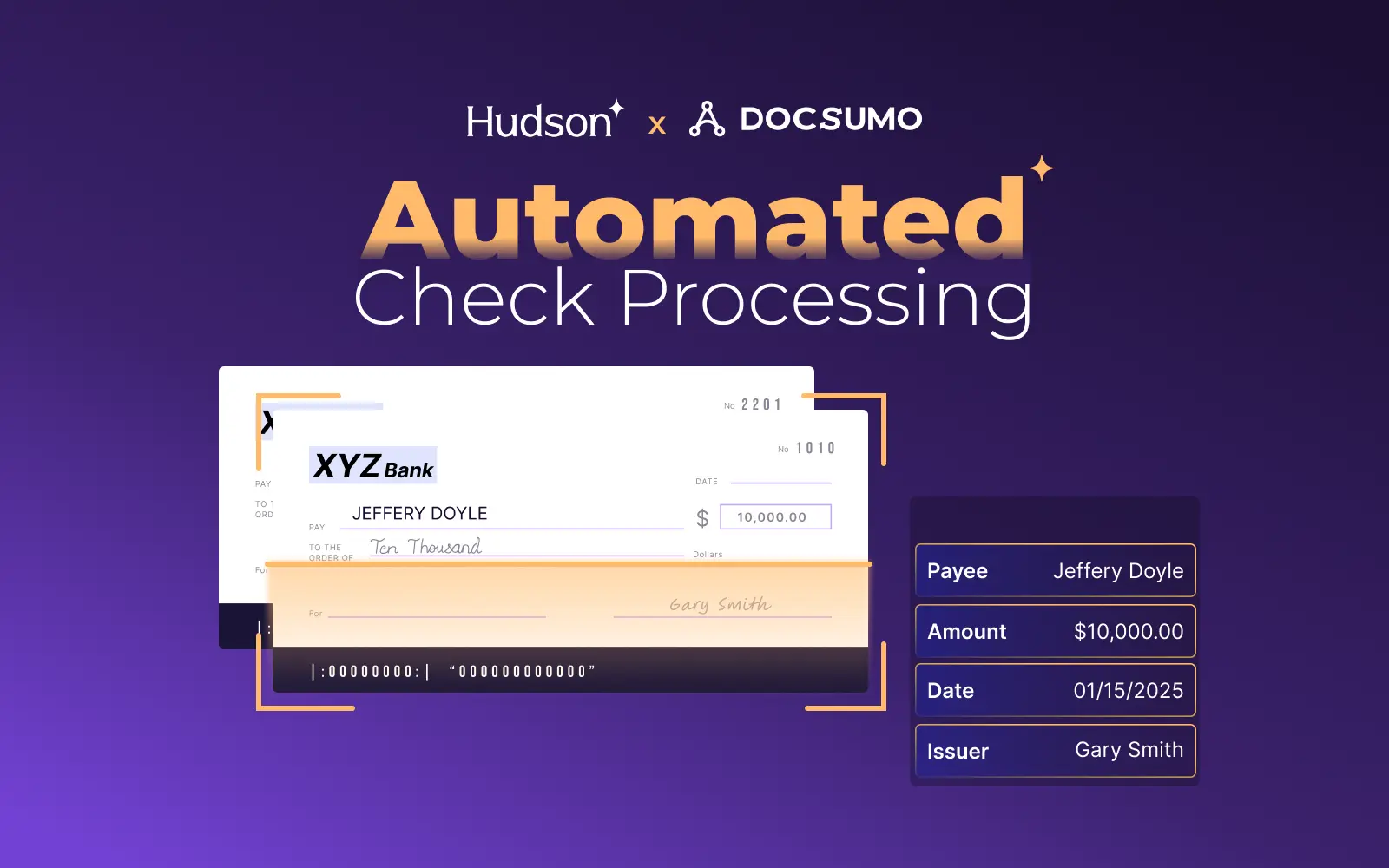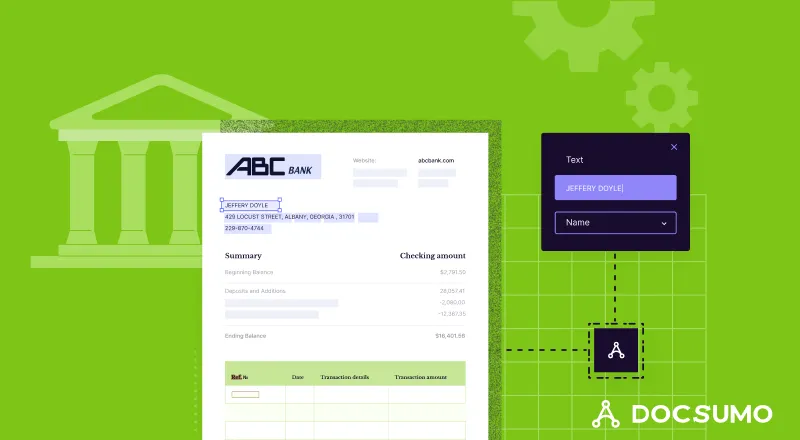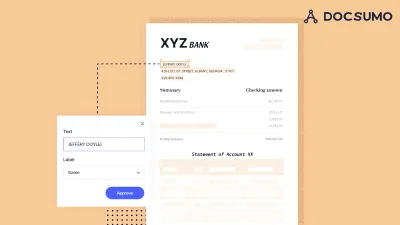Transforming Treasury Operations With Intelligent Document Processing

Executive Summary
- Hudson has achieved 99% automation in check processing through advanced AI-powered document intelligence with Docsumo.
- The partnership eliminates hundreds of hours of monthly manual processing while dramatically reducing fraud exposure.
- Treasury teams can now redeploy talent from mundane data review tasks to strategic financial analysis and relationship management.
The Hidden Cost of Paper Check Processing in Modern Treasury Operations
In an era of instant payments and digital transformation, a surprising reality persists in corporate America: 75% of organizations still use paper checks, despite their high costs and inefficiencies. For treasury management teams processing thousands of checks monthly, this reliance on paper creates a cascade of operational challenges that extend far beyond simple inconvenience.
The 2024 AFP Payments Fraud and Control Survey revealed that 80% of organizations experienced attempted or actual payments fraud, up from 65% in 2022. Checks continued to be the most problematic payment method, with 65% of organizations reporting check fraud activity. This alarming trend highlights a critical truth: manual check processing isn't only inefficient but also increasingly dangerous.
Treasury professionals face a perfect storm of challenges. The median costs to issue paper checks hover around $2-$4 apiece, while the cost to receive them runs about $1-$2 per check, creating substantial overhead for high-volume operations. Beyond direct costs, manual processing introduces human error, delays approval workflows, and creates vulnerabilities that sophisticated fraudsters increasingly exploit.
The human toll compounds these financial pressures. Skilled treasury professionals spend countless hours on repetitive data entry, manually verifying check details, and reconciling discrepancies—time that could be invested in strategic analysis, cash flow optimization, and building stronger banking relationships. It's a misallocation of talent that forward-thinking organizations can no longer afford to ignore.
Understanding the Fraud Epidemic: Why Traditional Controls Are Failing
The explosion in check fraud represents more than a temporary spike—it's a fundamental shift in the sophistication of criminal activity. The 2024 Check Fraud Report highlights a 90% increase in check fraud suspicious activity reports from 2021 to 2023, corresponding to an estimated $21 billion in losses last year. These aren't amateur operations; organized criminal networks now leverage technology and social engineering to execute complex schemes at scale.
Remote Deposit Capture fraud accounted for $400 million in losses in 2023, while synthetic identity fraud—combining real and fictitious information to create fake personas—has grown 28% year over year since 2022. Traditional manual review processes, designed for simpler threats, struggle to identify these sophisticated attack vectors.
The geographic distribution of fraud adds another layer of complexity. While check fraud impacts all 50 states, the Eastern Seaboard shows a particularly high density of incidents, with metropolitan areas like New York City and Baton Rouge illustrating how threat groups conduct mail theft-related check fraud. For treasury teams managing nationwide operations, this uneven risk landscape demands intelligent, automated detection capabilities that can identify patterns humans might miss.
Mail theft has emerged as a particularly insidious threat vector. Criminals target corporate mailboxes and postal collection points, stealing checks that they then alter using chemical washing techniques or sophisticated forgery methods. By the time treasury teams discover the fraud through traditional reconciliation processes, funds have often disappeared through complex money laundering networks.
The Partnership Solution: Where Intelligent Automation Meets Treasury Expertise
Hudson's partnership with Docsumo represents a paradigm shift in how treasury teams approach check processing. By combining Hudson's deep understanding of complex payment workflows with Docsumo's advanced document intelligence capabilities, the collaboration has achieved a 99% straight-through processing rate for paper checks across diverse formats and institutions.
This isn't simple optical character recognition (OCR) technology repackaged for financial services. Docsumo employs Intelligent Document Processing (IDP) that can process checks from hundreds of banks with multiple templates and layouts, eliminating the need to retrain models when banks modify their check formats. This adaptability proves crucial for treasury teams managing relationships with numerous financial institutions.
The technical architecture leverages multiple AI technologies working in concert. Computer vision algorithms identify and extract key check elements—MICR lines, amounts, memo fields, signatures, and endorsements—regardless of check orientation or quality. Natural language processing interprets handwritten amounts and memo fields, while machine learning models continuously improve accuracy based on processed volumes. Importantly, the system maintains complete audit trails, ensuring compliance with stringent financial regulations.
Transforming Operations: From Manual Burden to Strategic Advantage
The operational transformation enabled by this partnership extends far beyond simple time savings. Treasury teams report fundamental changes in how they approach their work, with cascading benefits across the organization.
Consider the typical check processing workflow before automation: documents arrive via mail or courier, staff manually enter data into multiple systems, supervisors review entries for accuracy, exceptions trigger investigation loops, and reconciliation occurs days or weeks later. Each step introduces delay, error potential, and vulnerability to fraud.
With the Hudson-Docsumo solution, that same workflow becomes seamless. Checks are digitally captured at the point of receipt, and check images requiring further analysis are routed to Docsumo, where data is extracted and validated in seconds. AI validations and smart error flags alert reviewers of manual processing mistakes, transforming exception handling from a time-consuming investigation into a few targeted interventions.
Real-time fraud detection capabilities analyze patterns across thousands of data points instantaneously. Unusual routing numbers, mismatched signatures, suspicious endorsements, and anomalous amounts trigger immediate alerts. Unlike manual review, which might catch obvious forgeries, the AI system identifies subtle indicators that could signal sophisticated fraud attempts.
The speed improvement alone justifies the investment for many organizations. What previously took days now happens in minutes. Treasury teams can provide same-day deposit confirmations, accelerate cash application processes, and improve working capital metrics. For organizations managing tight cash positions, this acceleration has a direct impact on financial flexibility.
Measuring Success: Quantifiable Returns and Strategic Value
The 99% automation rate headline tells only part of the story. Organizations implementing the Hudson-Docsumo solution report transformative improvements across multiple dimensions.
Processing time reductions average 80-90%, with some high-volume operations seeing even greater improvements. A mid-market company processing 5,000 checks per month typically saves over 200 hours of manual labor. Large enterprises processing tens of thousands of checks see proportionally larger gains, often eliminating entire operational units previously dedicated to manual data entry.
Error rates plummet from the industry average of 2-3% for manual entry to below 0.1% with automated processing. This accuracy improvement ripples through the organization, reducing reconciliation time, eliminating duplicate payments, and enhancing customer relationships that would have been damaged by payment errors in the past.
Fraud prevention metrics prove equally impressive. Early detection rates increase by 60-70%, with suspicious items flagged before funds are released and become irrecoverable. The combination of pattern recognition and anomaly detection catches fraud attempts that would bypass traditional controls. With consumers reporting losses of over $12.5 billion to fraud in 2024, representing a 25% increase over the prior year, these prevention capabilities become increasingly critical.
Perhaps most importantly, treasury teams report improved job satisfaction and higher retention rates. Freed from mundane data entry, professionals focus on strategic initiatives: optimizing payment terms, negotiating banking relationships, and driving working capital improvements. This shift from tactical to strategic work enhances both individual career development and organizational capability.
Implementation Excellence: A Roadmap for Success
Successful automation requires more than technology deployment—it demands thoughtful change management and stakeholder alignment. Hudson's implementation methodology, refined through numerous enterprise deployments, ensures smooth transitions that preserve operational continuity while delivering rapid value.
The process begins with comprehensive workflow analysis. Hudson's specialists map existing processes, identify opportunities for automation, and design optimized workflows that leverage both technology and human expertise. This isn't about replacing like-for-like — it's about discovering new capabilities and approaches.
Integration proves surprisingly straightforward and most organizations achieve full production deployment within 30-60 days, with phased rollouts minimizing disruption.
Training focuses on exception handling and system optimization rather than basic operation. The intuitive interfaces require minimal technical expertise, allowing treasury teams to become proficient quickly. Continuous learning capabilities enable the system to improve with use, adapting to organization-specific patterns and requirements.
Change management addresses the human element. Clear communication about automation's role—enhancing rather than replacing human judgment—helps overcome resistance. Early wins with high-volume, low-complexity checks build confidence before tackling more complex scenarios. Regular feedback loops ensure the system evolves as business needs change.
Looking Ahead: The Future of Intelligent Treasury Operations
The Hudson-Docsumo partnership represents just the beginning of treasury transformation. As artificial intelligence capabilities advance and payment modernization accelerates, forward-thinking organizations are positioning themselves for continued evolution.
Organizations implementing intelligent check processing today lay the groundwork for broader automation initiatives. The same AI capabilities that extract check data can process invoices, purchase orders, contracts, and other financial documents. Treasury teams familiar with AI-assisted workflows are more likely to adopt other emerging technologies, such as real-time payments and agentic workflows.
The competitive implications are profound. Organizations that automate routine processing gain strategic advantages: faster cash conversion cycles, superior fraud prevention, lower operational costs, and higher employee engagement. As these advantages compound, the gap between automated and manual operations widens, creating winner-take-all dynamics in many industries.
Partnership, Not Just Technology
Hudson and Docsumo have demonstrated that check processing automation isn't about choosing between efficiency and security—it's about achieving both through intelligent partnership. By combining Hudson's deep payment expertise with Docsumo's cutting-edge AI capabilities, treasury teams can transform their most challenging operational burden into a strategic advantage.
When mundane tasks are automated, human talent can focus on what matters: building relationships, optimizing strategies, and driving growth. In an environment where treasury teams are becoming strategic advisors rather than just process executors, this transformation isn't optional—it's essential.
Ready to transform your treasury operations? Contact Hudson Technology Systems to learn how intelligent check processing automation can free your team to focus on strategic initiatives while dramatically reducing fraud risk and operational costs.



.webp)


.webp)
.webp)
.webp)
.webp)